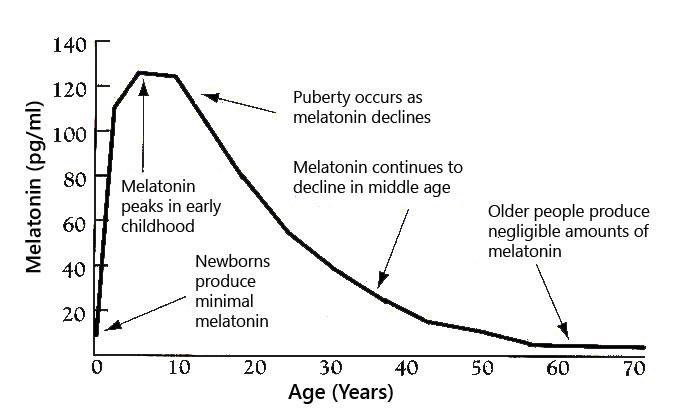In this chart above, you can see that by age 50, melatonin levels have declined to the level of a newborn which is quite low when compared to the peak seen in childhood. In the following link, there is a chart that you have to scroll down to page 8 to see and it shows how the incidence of PD increases with age. Interestingly, the incidence of PD starts to increase noticeably from age 50.
parkinsons.org.uk/sites/def...
Seems like an interesting coincidence.
Look at the following chart and notice how Deaths from Covid-19 start to notably increase from age 50 and up.
statista.com/statistics/119...
Seems like an interesting coincidence.
Men age 45 or older and women age 55 or older are more likely to have a heart attack than are younger men and women.
mayoclinic.org/diseases-con...
Seems like an interesting coincidence.
Middle age is when diabetes diagnoses really start to spike. An estimated 14% of Americans ages 45 to 64, or 11 million people, are diagnosed with type 2. That’s almost five times the rate for those 18 to 44.
webmd.com/diabetes/diabetes...
Seems like an interesting coincidence.
Risk increases significantly after age 50, and half of all cancers occur at age 66 and above. According to the National Cancer Institute, one quarter of new cancer diagnoses are in people aged 65 to 74. Refer to the chart above to see where melatonin levels are at this age range.
ncbi.nlm.nih.gov/pmc/articl...
Seems like an interesting coincidence.
Osteoporosis also starts to become a bigger issue around age 50 when bone stability starts to head south.
hopkinsmedicine.org/health/...
Seems like an interesting coincidence.
From this link you can see that stroke starts to noticeably increase from age 50.
ncbi.nlm.nih.gov/core/lw/2....
ncbi.nlm.nih.gov/pmc/articl...
Seems like an interesting coincidence.
Another interesting coincidence is that melatonin has been shown in studies to help all of these diseases.
Art

 I am the same way (guess I inherited her DNA), and even 1mg Melatonin that I tried, it made me very groggy the following day. So I decided that Melatonin was not for me. I do have osteopenia, and I would love to take Melatonin, but I just can't function the next day even at 1mg.
I am the same way (guess I inherited her DNA), and even 1mg Melatonin that I tried, it made me very groggy the following day. So I decided that Melatonin was not for me. I do have osteopenia, and I would love to take Melatonin, but I just can't function the next day even at 1mg.